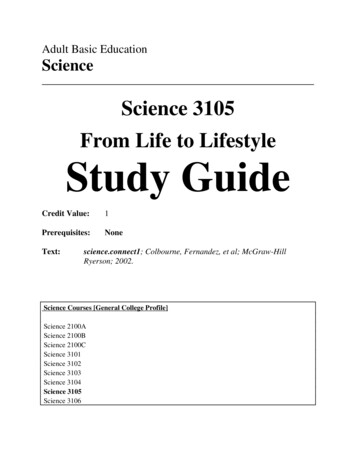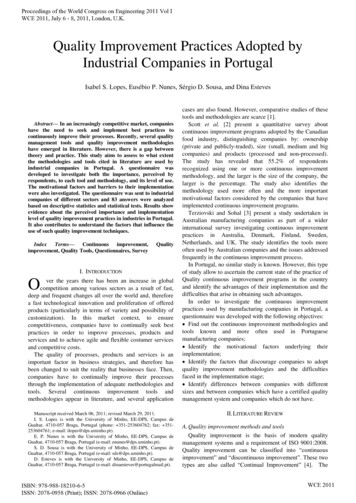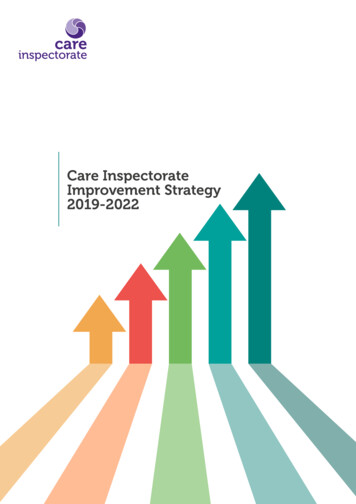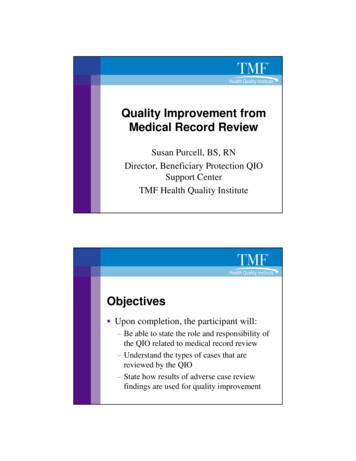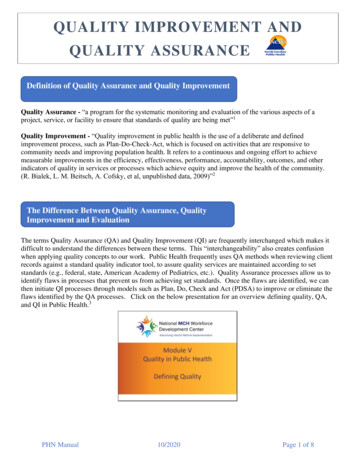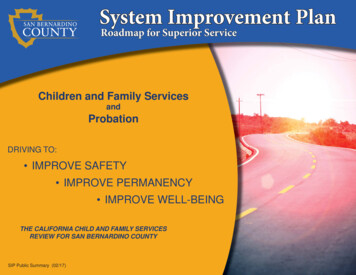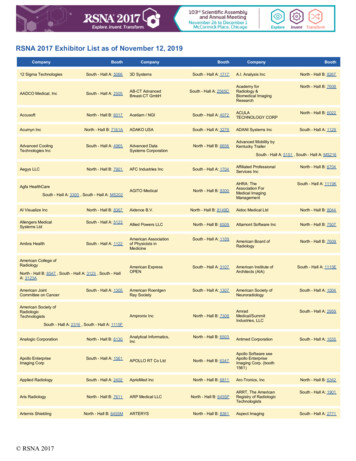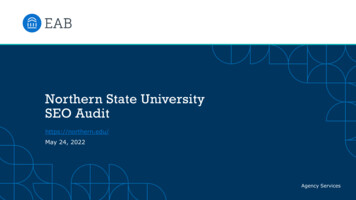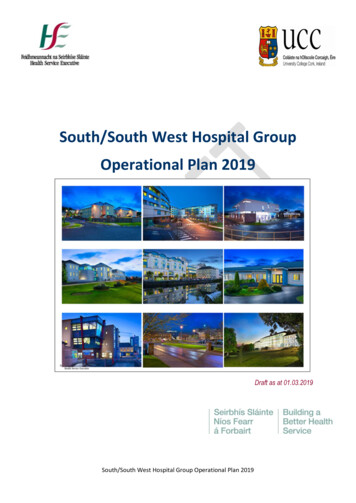
Transcription
CAAL10/26/17Agenda Item 2bNew Program ProposalDoctorate of Education in Education Systems Improvement ScienceClemson UniversityExecutive SummaryClemson University (CU) requests approval to offer a program leading to the Doctorate of Education inEducation Systems Improvement Science, to be implemented in May 2018. The proposed program is tobe offered through traditional instruction and distance education. The chart below outlines the stages ofapproval for the proposed program. The Advisory Committee on Academic Programs (ACAP) voted torecommend approval of the proposal. The full program proposal and support documents are attached.Stages ofConsiderationProgram ProposalReceivedACAP ConsiderationDateComments7/24/17Not Applicable09/14/17 Clemson University (CU) representatives introduced the programas an applied degree with components in equity and social justice.The proposed degree was presented as a formal collaboration, aconsortium between Winthrop University, The Citadel, CoastalCarolina University, and Clemson University. Two essentialconsortium features are student recruitment and sharedprogramming resources. ACAP members and CHE staff inquiredabout both and institutional representatives expanded on theproposal’s explanation about student recruitment, starting withthe Ed.S at each institution. Staff asked about recruitment fromnon-consortium institutions. Clemson representatives reiteratedthe goal of recruiting consortium members but added USC Ed.S.completers were a target population. They indicated Ed.S.completers from SC State could apply as well. Clemson alsoindicated the consortium exists for more than this programcollaboration. CHE staff stressed the apparent importance of theconsortium agreement to the success of implementing andsustaining the program and requested that Clemson provide itprior to CAAL.Clemson addressed questions ACAP members transmitted prior tothe meeting. Specifically, there were questions regarding theproposed program’s similarity to programs at the University ofSouth Carolina (USC) and South Carolina State University (SCSU).Clemson indicated the proposed program was similar but not thesame since their program delivery was a hybrid, the title wasdifferent, and the targeted population was similar but not thesame. Clemson representatives indicated the program wouldtarget a cohort of 15 each year with a maximum of 25. Regardingcoursework, Clemson representatives indicated that only threeClemson University, Ed.D., Education Systems Improvement Science, CAAL, 10/26/2017 – Page 1
CAAL10/26/17Agenda Item 2bStages ofConsiderationDateCommentsclasses were similar between the degrees. Clemson plans topartner with the districts to offer face-to-face classes andflexibility in comparison to USC’s 100% online program.CHE staff asked about the time to completion. Clemsonrepresentatives suggested a working professional could completethe 24 hours of coursework in 12 months and then continue withthe research and dissertation. One-third of the courses could becompleted on a Clemson campus in locations across the state orat the three partner (consortium) institutions. CHE staff asked forclarification on costs associated with sharing instructional spaces,resources such as faculty, and support spaces (facilities, security,HVAC, etc.).ACAP discussion focused on a) some continued concerns aboutprogram duplication; b) the formal agreement between thepartner (consortium) institutions; and c) the number of studentswithin the consortium who would be eligible and interested in theprogram.Comments, questions,and suggestions fromCHE staff sent to theinstitution9/20/17Following the discussion, ACAP members voted to recommendthe program proposal.Staff requested revisions to address the following questions asdiscussed at ACAP or transmitted afterward: Provide a name/focus for the Ed.D. Provide a context for thisdegree nationally or justification for this name. Explain how this program differs from USC where 15 of the 24required hours could be the same courses? Provide a moredetailed comparison of this program and the programs atSCSU and USC. What are the “persistent systemic-level issues” this degreewill address as indicated in the original proposal? How is this program unique if no new coursework is required? There is a concern regarding sustainability since the listedconsortium programs have only had 57 completers in the pastthree years that would be eligible. Please clarify howClemson will meet target enrollment numbers. If potential participants include the Ed.S. in Counseling atClemson, what is the advantage of this program versus a Ph.Din counseling? Is there an intent to recruit outside the consortium programsas stated during the ACAP meeting? Since requirements for the stated employment opportunitiesare met through degrees and certifications previouslyClemson University, Ed.D., Education Systems Improvement Science, CAAL, 10/26/2017 – Page 2
CAAL10/26/17Agenda Item 2bStages ofConsiderationDateRevised ProgramProposals Received9/27/17Revised ProgramProposals Received10/20/17Commentscompleted by the applicants, explain how does this degreeenhance or increase employment opportunities? How does this degree help increase the number of qualifiedadministrators since the admission criteria would show theyare already qualified for the administrative position? Provide signed copies of the MOU between the consortiumschools related to this Ed.D. Include agreements forinstructional spaces, support spaces, faculty qualifications,and library resources as discussed at ACAP. Will faculty and other resources at the partner institutions beused for administration of this program? If so, provide detailsand how it will impact each consortium member’s budget. Will tuition dollars be shared between institutions? If so, whatare the details of this agreement? Explain how an education professional on a 10-12 monthcontract could complete the 24 hours of coursework in oneyear while working full time.The revised proposal satisfactorily addressed the questions andrequest for revisions, with the exception of the conditions listedin the recommendation and the degree name.The revised proposal addressed the request for revisions to thename of the degree. Remaining requested revisions are includedin the conditional recommendation.RecommendationThe staff recommends the Committee on Academic Affairs and Licensing approve the program leadingto the Doctor of Education in Education Systems Improvement Science (Ed.D.) with the followingconditions, to be implemented in May 2018: (1) Modify the cognate to develop the focus of the degree.Currently, these six hours which represent 25% of the coursework associated with the degree, could beon any topic approved by an advisor; (2) Revise CIP and degree name as needed to reflect the focus ofthe degree; and (3) Present a signed Memorandum of Agreement between the partner institutionsassociated with the Ed.D., including The Citadel, Coastal Carolina University, Winthrop University, andClemson University.Name of InstitutionClemson UniversityName of Program (include concentrations, options, and tracks)Education Systems Improvement Science, Ed.D. (Doctorate in Education)Program DesignationClemson University, Ed.D., Education Systems Improvement Science, CAAL, 10/26/2017 – Page 3
CAAL10/26/17Agenda Item 2bAssociate’s DegreeMaster’s DegreeBachelor’s Degree: 4 YearSpecialistBachelor’s Degree: 5 YearDoctoral Degree: Research/Scholarship (e.g., Ph.D. andDMA)Doctoral Degree: Professional Practice (e.g., Ed.D., D.N.P., J.D., Pharm.D., and M.D.)Does the program qualify for supplemental Palmetto Fellows and LIFE Scholarship awards?YesNoProposed Date of ImplementationMay 2018CIP Code: 130101Delivery Site(s)Main Campus and Off-Site Distance EducationDelivery ModeTraditional/face-to-face**select if less than 50% onlineDistance Education100% onlineBlended (more than 50% online)Other distance educationProgram Contact Information (name, title, telephone number, and email address) Dr. Robert Knoeppel, Professor and Chair, Department of Education and OrganizationalLeadership Development, rck@clemson.edu, 864-656-1882Dr. Debra Jackson, Professor Emeritus, dbj@clemson.edu; 864-650-0667Dr. Jeremy King, Associate Provost, jking2@clemson.edu; 864-656-1492Institutional Approvals and Dates of ApprovalDepartment Curriculum Committee:Department Chair:College Curriculum Committee:College Dean:University Graduate CurriculumProvost:President:Board of 4/07/201704/19/201704/19/201704/21/2017Clemson University, Ed.D., Education Systems Improvement Science, CAAL, 10/26/2017 – Page 4
CAAL10/26/17Agenda Item 2bBackground InformationState the nature and purpose of the proposed program, including target audience and centrality toinstitutional mission. (1500 characters)The proposed Doctorate in Education, Ed. D. is designed to provide certified PK-12 practitioners,regardless of current job titles, positions, or content areas, with the opportunity to pursue an appliedprofessional doctoral degree. The Ed. D. focuses on the practice of education, with an emphasis onaddressing educational issues as well as seeking specific strategic improvements in educational settingsand educational outcomes.After conducting an online search of “names” of Ed.D. programs, we found one programs that specified“General Education”; Harvard offers a general Ed.D. in d). We are requesting a unique program name for thisprogram.The program is designed to focus on problems of practice in schools with the goal of obtaining a deepunderstanding of the problem, the system that produces the problem, and a shared theory of practice todrive improvement. The degree is not specific to a content area like Curriculum & Instruction,Administration & Supervision or Counseling. Rather it is about understanding the practice of education,systems of education, and how to improve education in order to better serve all children. The name ofthe degree is also aligned nationally with the goals of the Carnegie Foundation for the Advancement ofTeaching that has advocated for more research on persistent problems (also called ‘wicked’ problems) ofpractice.Therefore, the faculty at Clemson designed a program based on the CIP code 13.0101 Education,General.Definition: A program that focuses on the general theory and practice of learning and teaching,the basic principles of educational psychology, the art of teaching, the planning andadministration of educational activities, school safety and health issues, and the socialfoundations of education. aspx?y 55&cipid 88109 )The program is designed based on the principles and philosophies of the Carnegie Project on theEducational Doctorate. CPED’s definition of the Education Doctorate reads in part, that the professionaldoctorate prepares graduates for the “application and specific practices, the generation of newknowledge, and for the stewardship of the profession.” The CPED guiding principles are part of thefoundation of the program and instrumental in the design. The first sentence of the CPED principles iskey: A professional educational doctorate will focus on “a research and development agenda to test,refine, and validate principles for the professional doctorate in education.”Clemson’s proposed Ed. D. requires a student to have completed an Ed.S. This means that the studentsenter the doctoral program already certified in their field of study in education. The Ed.D. program isdesigned to build upon the student’s specialist program to address complex and persistent problems ofpractice through research and scholarship that is application driven. You will find in the AdmissionCriteria of this document includes the following: Provide a statement of research interest developedduring the Ed. S. internship.The contextual framework for the research of the ED.D. centers around three themes: inquiry as practice,laboratories of practice, and problems of practice that leads to dissertations that looks to solve complexproblems in facing South Carolina schools. Another guiding principle that drive CPED is the framing ofClemson University, Ed.D., Education Systems Improvement Science, CAAL, 10/26/2017 – Page 5
CAAL10/26/17Agenda Item 2bquestions of practice and the seeking of solutions to complex problems based on access, equity, ethics,and social justice.Uniqueness of the Proposed Ed.D. for South Carolina:The degree is unique for a variety of reasons, chief among those reasons is the fact that the degree is acollaboration between three other institutions of Higher Education, Clemson, and local school districts.The Carnegie Foundation for the Advancement of Teaching as well as the Carnegie Project on theEducation Doctorate advocate for the creation of networked communities to drive educationalimprovement. It is through these communities of practice that students and faculty examine persistentproblems of practice, to develop and test theories of practice, and to implement new models of deliverythat meet the needs of all students.The Ed.S. at each of the four institutions of higher education is offered in collaboration with local schooldistricts, thus creating a pipeline of interested students, a setting in which to study schools and schooldistricts, an opportunity to pilot improved educational practice, and the ability to change practice for thebetterment of all students.This degree is about the study of education and the development, testing, and refinement of interventionsin education. The cognate classes at Clemson are contextual to South Carolina, chosen based on theproblem of practice to be studied, and related to the persistent problems faced by educators in this state.Chief among those problems are underachievement related to poverty, race, and rurality.Clemson recognizes the important role that the Ed.D. programs at SC State University and USCColumbia play in preparing education practitioners for academic administration and leadership roles incurriculum and instruction. Clemson is proposing a unique Ed.D. to complement, not compete with, thesevaluable programs; this Ed.D. will prepare an intentionally annually-limited cohort of certified Ed. S.practitioners to address persistent systemic-level issues via field-embedded research to inform differencemaking practice as part of their ongoing and future work in the PK-12 system that promotes career andcollege readiness. The focus of leadership in school systems has changed to include an examination byfaculty and others of the empirical evidence of best practices that support student achievement. For thisreason, the Carnegie Project on the Education Doctorate (CPED) underpins the program design. Thisunderpinning recognizes the importance of: a) awareness of the systemic context of challenges facingschools in South Carolina, and b) field-embedded research in and about schools and school systems indriving improvements in student outcomes. Under a CPED model, graduate student and faculty researchefforts highlight best practices to effect systemic change by guiding educational practice to improveeducational outcomes for children in South Carolina.What is needed for these leaders in PK-12 education is a more applied doctoral research program. Perthe Carnegie Project on the Education Doctorate (CPED), the doctorate in education prepares educators“for the application of appropriate and specific practices, the generation of new knowledge, and for thestewardship of the profession.” With this definition in mind, CPED has established several workingprinciples. Among these are the beliefs that the professional doctorate is framed around questions ofequity, ethics and social justice to bring solutions to complex problems of practice; that the programsleading to the professional doctorate include field-based opportunities to analyze problems of practiceand use multiple frames to develop meaningful solutions; and that the professional doctorate is groundedin and develops a professional knowledge base that integrates both practical and research knowledgelinking theory with systematic inquiry. The Carnegie Project, then, provides a framework and rationale forthe professional doctorate in education (Ed. D.)The Carnegie Project on the Education Doctorate defines a problem of practice as a “persistent,contextualized, and specific issue embedded in the work of a professional practitioner, the addressing ofClemson University, Ed.D., Education Systems Improvement Science, CAAL, 10/26/2017 – Page 6
CAAL10/26/17Agenda Item 2bwhich has the potential to result in improved understanding, experience, and outcomes.” As such, theEd.D. program at Clemson University will include coursework that encourages students to explore issuesin educational leadership such as instructional leadership, equitable financing systems, schoolimprovement, and politics of education. The program will culminate with an action-based researchdissertation in which the candidate works collaboratively with the faculty at Clemson University,collaboration partner universities, and local school districts to design a field embedded project to study aproblem of practice. It is expected that the collaboration with local school districts will include access todata on student achievement, faculty evaluation, educational practice, and other measures of studentoutcomes or program success.Previous leadership theory is thought to be insufficient to address the current demands of education.Effective schools are characterized by a culture wherein there is a shared purpose, decisions are madecollaboratively, responsibilities are distributed among teacher leaders and capacity exists to create andsustain change. Increasingly, educational leaders must be the stewards of a vision of success for allstudents as they work to achieve consensus on the purpose of education and to implement the necessarystructures to change the process of teaching and learning in order to assist all children to reach mandatedlevels of proficiency. This Ed.D. is designed for graduates with an Ed.S. in a variety of content areas withthe purpose of developing leaders and change agents for PK-12 regardless of current job titles, positions,or content degrees. Three regional comprehensive universities have identified the need for a selectgroup of their annual Ed.S. graduates to have an opportunity for continued study.The proposed program differs from Clemson’s current Doctor of Philosophy (Ph. D.) programs in twodistinct ways. First, the program student learning outcomes are designed for the practitioner who wishesto remain in the school system rather than move into higher education faculty roles. Second, the marketfor student recruitment of the two degrees differ. Most, if not all, will be part-time graduate students andfulltime employees of a school system. The purpose of the program is to provide leaders in educationwho bring “equity, ethics and social justice” to solutions to complex problems of practice. (CPED)The most pressing problems in education in South Carolina are access, poverty, equity, under resourcedrural schools, technology, student health and community engagement in education. Other relevant issuesthat require research are the teacher pipeline, teacher preparation and retention. We refer to theseproblems as the “persistent systemic-level issues” that the proposed degree is designed to tackle. SouthCarolina has been ranked 50th in P-12 education. -ranks-last-in-education-in-u-s-news/article 5a7d26c8-fe9d-11e6-96442bab813ed6f7.html). The College of Education at Clemson is committed to improving P-12 educationthrough several strategies. One strategy is the through the Ed.D. program and the preparation of leadersin education who bring new approaches to solutions facing our state’s schools.Centrality to the University’s Mission: ClemsonForward (the University’s strategic plan) is “built on fourkey foundations: Research, Engagement, the Academic Core and Living.” The proposed degree programaligns with all four of the foundations found in the plan. It provides faculty and graduate students anopportunity to focus on the application of educational research in the school districts, with opportunitiesfor impacting individual students directly and system-wide. Through a formal collaboration with TheCitadel, Coastal Carolina, Winthrop, and Clemson faculty and students will engage with colleaguesacross the state. The proposed program will increase opportunities for graduates of the comprehensiveuniversities to further their education while at the same time enabling them to continue to serve inclassrooms and district leadership offices in SC; in this way, Ed. D. students will be able to apply researchthrough practice. In addition, by building on their Ed. S. degrees, the graduate students will be able tomake more timely progress toward the terminal degree. In addition, the College of Education’s missionstatement states that the College is to be a “transformative leader in systemically improving education.”This mission statement is clearly aligned with the goals of the professional doctorate as articulated byCPED.Clemson University, Ed.D., Education Systems Improvement Science, CAAL, 10/26/2017 – Page 7
CAAL10/26/17Agenda Item 2bThree regional institutions (Winthrop, Coastal Carolina, and The Citadel) approached Clemson seekingfurther opportunities for their graduates. The College of Education, in discussions with these leaders ineducation, has ascertained that large numbers of teachers, counselors, principals, and superintendents inPK-12 districts are interested in continuing their education beyond the educational specialist (Ed. S.)degree. While the Ph.D. is one possible avenue for these individuals, the standard research dissertationdoes not address the learning and professional needs and interests of this practice-based population.Student recruitment will be from these three regional institutions as well as Clemson’s graduates.The program design supports potential students who are in a variety of positions within the PK-12systems of education in SC and who are seeking opportunities to further their education beyond theEd.S., and remain as practitioner in a PK-12 system. A variety of job titles of the potential studentsinclude, but are limited to, district level leaders, teachers, counselors, educational technology staff,finance officers, student services support personnel, and so forth. The applicant must have completed anEducational Specialist degree prior to admission into the program.The delivery method of the program is a hybrid. Courses will be taught using distance educationtechnology (online for some classes, a mixed of technologies in others, and both on and off-campus forthose courses requiring in- person instruction). When needed for courses that are best taught in person,the classes would use a classroom in a Clemson facility (University Center of Greenville, CURI, etc.) or ina classroom at one of our partner institutions (Winthrop, The Citadel, Coastal Carolina). The 21 hours ofcoursework will be completed in a twelve-month period, followed by the comprehensive examination(given on campus during Year 2) and then the initiation of the dissertation with EDL 9890 taught inresidence on campus. EDL 9890 is designed as a seminar for developing the proposal for thedissertation.In summary, the Ed. D. program – and the burgeoning relationship with the three comprehensiveuniversities in the state – will make a difference in our communities, our campuses and the state.Importantly, the foundational premise of the Carnegie report statement, “the belief that the professionaldoctorate is framed around questions of equity, ethics and social justice to bring solutions to complexproblems of practice,” aligns with ClemsonForward as well.List the program objectives. (2000 characters)The faculty of the College of Education and the Department of Education and Organizational LeadershipDevelopment have developed the following program objectives.1. Deliver an advanced professional degree program based on relevant standards, measurableoutcomes, and application of new educational strategies.2. Prepare graduates for problem-based research with an emphasis on complex problems ineducational practice.3. Address equity, ethics, and social justice in educational environments.4. Serve as leaders in implementing new innovative approaches in education.5. Develop collaborative research initiatives that inform educational practice for constituenciesserved by members of our partner institutions.6. Design research and evaluation models to assess the success of changes in educationalpractice.7. Analyze student achievement through student admission, retention, progression, graduation andemployment.8. Establish and maintain a seamless progression from collaborative member institutions’ graduateprograms (Ed.S.) to the Clemson Doctorate in Education (Ed. D.).9. Engage with collaborative universities through a formal agreement: Consortium of InnovativeEducational Practice.Clemson University, Ed.D., Education Systems Improvement Science, CAAL, 10/26/2017 – Page 8
CAAL10/26/17Agenda Item 2bAssessment of NeedProvide an assessment of the need for the program for the institution, the state, the region, andbeyond, if applicable. (1500 characters)The professional doctorate at Clemson University will meet the needs of a SC market. Due to the largenumbers of Ed. S. graduates annually and those individuals who have already completed the degree andare in the workforce, there is a significant market for the program. We are able to capitalize on thestrengths of the graduates with educational specialist degrees from the Citadel, Coastal Carolina, andWinthrop. The College of Education deans and program coordinators at these three institutions havereviewed their Ed. S. curriculum, and the alignment from the Ed. S. to the proposed Clemson Ed. D. hasbeen mapped by the faculty of the four universities. The purpose of the mapping of the degree programsis to streamline the educational process, eliminate gaps in prerequisites for the doctorate, and preparestudents for the transition into the doctoral program. The admitted students will have completed aminimum of 30 graduate hours beyond the master’s degree, completing both the Ed. S. and any requiredstate certification for practice before admission. The proposed Ed. D. will add an additional 42 hours ofpost Ed. S. credit hours, including the dissertation.The three collaborating universities (The Citadel, Coastal Carolina, and Winthrop) and Clemson haveprovided data supporting enrollment numbers of 15 to 25 students in each cohort class for the Ed. D. Infact, the number of Ed. S. graduates annually exceeds Clemson’s capacity to enroll all graduates from thefour universities into the program. Further, institutional data document the viability of the degree programincluding the number of students enrolled in Clemson’s Ed. S. programs. We are continuing to collectinformation related to the needs assessment, but we feel confident about the cohort size based on ourdiscussions with the three comprehensive universities. Letters of support are attached to this document.There is no intention in proactively recruiting USC’s Ed.S. graduates, nor those at SCSU. Marketingefforts are focused on enrolled and graduates of the four collaborating universities. We have evidencethat between the partner institutions and Clemson’s own’s Ed.S. graduates and enrolled doctoral studentsthat we will have more than adequate number of applicants for the program. Our partner institutions haveprovided evidence of interest in the Ed.D. from their previous graduates and current students.Clemson currently has over 100 PhD students and many have expressed an interest in an Ed.D. shouldone at Clemson become available. Overtime, we anticipate the number of applicants to increase notdecrease, and if so, we will need to consider multiple cohorts classes.Why would a student choose an Ed.D. rather than a PhD in any field of study? At Clemson, the PhDprograms are focused on the preparation of college and university faculty members as opposed to K-12practitioners—those potential students who wish to remain and practice in the K-12 system. The fieldbased orientation of the Ed.D. would make it attractive to a host of educational professionals currentlyconsidering or pursuing doctorates at Clemson.Employment OpportunitiesIs specific employment/workforce data available to support the proposed program?YesNoClemson University, Ed.D., Education Systems Improvement Science, CAAL, 10/26/2017 – Page 9
CAAL10/26/17Agenda Item 2bIf yes, complete the table and the component that follows the table on page 4. If no, complete thesingle narrative response component on page 5 beginning with “Provide supporting evidence.”Increasingly, educational leaders must be the stewards of a vision of success for all students asthey work to achieve consensus on the purpose of education and to implement the necessary structuresto change the process of teaching and learning in order to assist all children to reach mandated levels ofproficiency. This Ed.D. is designed for graduates with an Ed.S. in a variety of content areas with thepurpose of developing leaders and change agents for PK-12 regardless of current job titles, positions, orcontent degrees.The title “administrator” in many education schools goes beyond principals and includes coordinators oftechnology, student support, counseling, and so forth.The Ed.D. improves the individual’s knowledge and skills by expanding their educational knowledge,practice and research skills. This is the foundation of the Ed.D. as a doctorate of the practice. Theprofessional practitioner with the Ed.D. can identify comp
The Advisory Committee on Academic Programs (ACAP) voted to recommend approval of the proposal. The full program proposal and support documents are attached. Stages of Consideration . Associate's Degree Master's Degree Bachelor's Degree: 4 Year Specialist Bachelor's Degree: 5 Year Doctoral Degree: Research/Scholarship (e.g., Ph.D. and .
